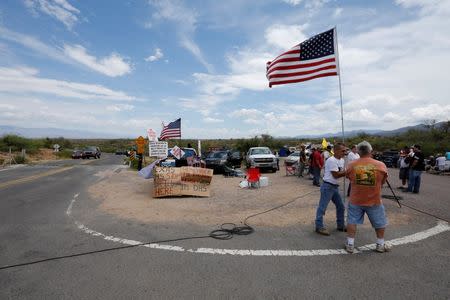U.S. top court bars Arizona from denying driver's licenses to immigrants

By Lawrence Hurley WASHINGTON (Reuters) - The U.S. Supreme Court on Wednesday blocked the state of Arizona from enforcing a policy that denies driver's licenses to young immigrants granted legal status by President Barack Obama in 2012. The court denied the request by Arizona Governor Jan Brewer to place a hold on a ruling from the San Francisco-based 9th U.S. Circuit Court of Appeals, which said the policy had no legal basis. The state must now let roughly 20,000 eligible immigrants apply for driver's licenses. "This is the best day ever," said Phoenix-based activist Dulce Matuz. "This will mean a lot to so many people." Matuz, whose Arizona Dream Act Coalition was among the groups that challenged the policy in court, said the decision saves taxpayer dollars and would have an immediate impact. "This is going to open the door for people to begin living a more normal life," she said. It was not clear when the licenses will be available. The Supreme Court's brief order noted that three conservative members among the nine justices - Antonin Scalia, Clarence Thomas and Samuel Alito - would have granted Arizona's request. The affected residents were granted legal status under a 2012 federal program that critics called amnesty. A similar program announced by President Barack Obama last month would grant legal status to 4.4 million immigrants. Brewer, a Republican who is about to leave office, and fellow Republican governors have said they will contest that program in court. Brewer's spokesman, Andrew Wilder, said the state was waiting for a lower court to issue the injunction needed to bring the Supreme Court ruling into force. To be eligible under the 2012 program called "Deferred Action for Childhood Arrivals," or DACA, immigrants must have come to the United States before the age of 16 and had to be below 31 as of June 15, 2012. They must also be enrolled in school, or have graduated from high school or obtained a high school equivalency diploma, and have no serious criminal convictions. Carla Chavarria, who came to Arizona illegally with her mother from Mexico City in 2000, said the days of her being considered a second-class citizen were over. "I've done everything I could to belong to this country," said Chavarria, 21, who started a marketing company in the Phoenix area and was also a plaintiff in the lawsuit. "It wasn't fair that I wasn't able to drive. Now that's all changed." (Additional reporting by David Schwartz in Phoenix; Editing by Kevin Drawbaugh, Jeffrey Benkoe, Eric Walsh and Mohammad Zargham)

